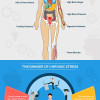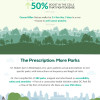
Did you know that between 75 and 90 percent of all doctor’s office visits are for stress-related ailments and complaints? For this reason, it is important to understand the many different ways in which stress impacts our health and wellbeing. This infographic guide shows how stress affects the body and also offers some practical pointers on stress management.



